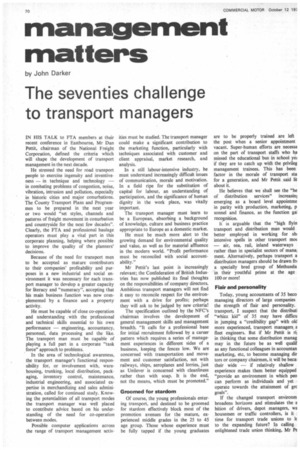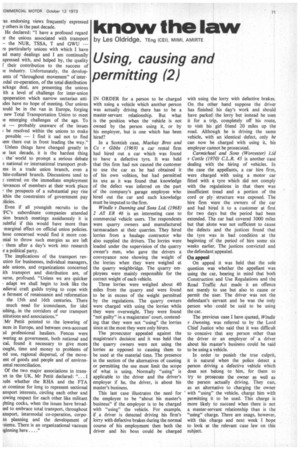management matters
Page 68

Page 69

If you've noticed an error in this article please click here to report it so we can fix it.
by John Darker
The seventies challenge to transport managers
IN HIS TALK to FTA members at their recent conference in Eastbourne, Mr Dan Pettit, chairman of the National Freight Corporation, defined the criteria which will shape the development of transport management in the next decade.
He stressed the need for road transport people to exercise ingenuity and inventiveness — in technique and technology — in combating problems of congestion, noise, vibration, intrusion and pollution, especially in historic cities and major conurbations. The County Transport Plans and Programmes to be prepared in the next year or two would "set styles, channels and patterns of freight movement in conurbation and countryside for the next few decades". Clearly, the FTA and professional haulage operators must play a vital part in this corporate planning, helping where possible to improve the quality of the planners' decisions.
Because of the need for transport men to be accepted as mature contributors to their companies' profitability and purposes in a new industrial and social environment it was necessary for each transport manager to develop a greater capacity for literacy and "numeracy". accepting that his main business function was now complemented by a finance and a property activity.
He must be capable of close co-operation and understanding with the professional and technical skills essential to his own performance — engineering, accountancy, personnel, data processing and the like. The transport man must be capable of playing a full part in a corporate "task force" approach to problems.
In the area of technological awareness, the transport manager's functional responsibility for, or involvement with, warehousing, trunking, local distribution, packaging, inventory control, maintenance, industrial engineering, and associated expertise in merchandizing and sales administration, called for continued study. Knowing the potentialities of all transport modes the transport manager was well placed to contribute advice based on his understanding of the need for co-operation between modes.
Possible computer applications across the range of transport management activ
ities must be studied. The transport manager could make a significant contribution to the marketing function, particularly with techniques associated with customer and client appraisal, market research, and analysis.
In a still labour-intensive industry, he must understand increasingly difficult issues of communication, morale and motivation. In a field ripe for the substitution of capital for labour, an understanding of participation, and the significance of human dignity in the work place, was vitally important.
The transport manager must learn to be a European, absorbing a background of knowledge, culture and business practice appropriate to Europe as a domestic market.
He must be much more alert to the growing demand for environmental quality and value, as well as for material affluence in the modern world. "Profit performance must be reconciled with social accountability."
Mr Pettit's last point is increasingly relevant; the Confederation of British Industries has now published its final thoughts on the responsibilities of company directors. Ambitious transport managers will not find it easy to reconcile respect for the environment with a drive for profits; perhaps they will ask to be judged by new criteria!
The specification outlined by the NFC's chairman involves the development of general management skills and management breadth. "It calls for a professional base for initial recruitment followed by a career pattern which requires a series of management experiences in different sides of a business, keeping the fences low. We are concerned with transportation and movement and customer satisfaction, not with railways, ships, aeroplanes and lorries, just as Unilever is concerned with cleanliness rather than with soap. It is the end, not the means, which must be promoted."
Groomed for stardom
Of course, the young professionals entering transport, and destined to be groomed for stardom effectively block most of the promotion avenues for the mature, experienced middle grades in the 25 to 45 age group. Those whose experience must be fully tapped if the young graduates are to be properly trained are left the post when a senior appointment vacant. Super-human efforts are necessa on the part of transport staffs who ha missed the educational bus in school yei if they are to catch up with the privileg management trainees. This has been factor in the morale of transport sta for a generation, and Mr Pettit said lit about it.
He believes that we shall see the "he of distribution services" increasinl emerging as a board level appointme in parity with production, marketing, p sonnel and finance, as the function ga recognition.
Ii. is arguable that the "high flyin transport and distribution man would better employed in working for slit intensive spells in other transport mot — air, sea, rail, inland waterways rather than in specialist sectors of mana ment. Alternatively, perhaps transport a distribution managers should be drawn fri a specially bred group of Methusela in their youthful prime at the age 100 or morel
Flair and personality Today, young accountants of 35 beco managing directors of large companies the strength of flair and personality. transport, I suspect that the distributi "whizz kid" of 35 may have difficu in jumping a "credibility gap" with old more experienced, transport managers, a fleet engineers. But if Mr Pettit is ri: in thinking that some distribution manag may in the future be as well qualif as any functional colleagues in accountan marketing, etc, to become managing dir tors or company chairmen, it will be becai their wide — if relatively shallow experience makes them better equipped "provide an environment in which peo can perform as individuals and yet operate towards the attainment of grc goals".
If the changed transport environm broadens horizons and stimulates the a bition of drivers, depot managers, wa housemen or traffic controllers, is it time for transport trade unions to It to the expanding future? In calling enlightened trade union thinking, Mr Pt
as endorsing views frequently expressed y others in the past decade.
He declared: "I have a profound regard n. the unions associated with transport – the NUR, TSSA, T and GWU — re particularly unions with which I have ad many dealings and I am continually npressed with, and helped by, the quality
their contribution to the success of Le industry. Unfortunately, the developants of "throughout movement" of interodal co-operation, of the total distribution ackage deal, are presenting the unions ith a level of challenge for inter-union )poperation which narrow sectarian attiides have no hope of meeting. Our unions iould be in the van in Europe, forging new Total Transportation Union to meet Le emerging challenges of the age. To — probably unaware of the issues be resolved within the unions to make possible — I find it sad not to find tern there out in front leading the way." Unless things have changed greatly in le last decade, it is the hardest thing the world to prompt a serious debate a national or international transport probms in a trade union branch, even a hite-collared branch. Discussions tend to t centred on the immediate employment ievances of members at their work place r the prospects of a substantial pay rise ithin the constraints of government pay Even if all youngish recruits to the FC's subordinate companies attended 'Lion branch meetings assiduously it is )ubtful if this would have more than marginal effect on official union policies. hose concerned would find it more conmial to throw such energies as are left p them after a day's work into research Pr a political party.
The implications of the transport revution for businesses, individual managers, ade unions, and organizations concerned ith transport and distribution are, of mrse, profound. "Unless we are quicker P adapt we shall begin to look like the edieval craft guilds trying to cope with e ferment of renaissance and reformation the 15th and 16th centuries. There much need for iconoclasm, for idol wiling, in the corridors of our transport stitutions and associations."
Mr Pettit pointed to the lowering of nces in Europe, and between own-account id professional hauliers. Fences were wering as government, both national and cal, found it necessary to give more [ought, time and money to problems of nd use, regional dispersal, of the moveent of goods and people and of environental reconciliation.
Of the two major associations in transrt in the UK, Mr Pettit declared: ".. . I itibt whether the RHA and the FTA m continue for long to represent sectional ansport interests, circling each other and towing respect for each other like militant gluing cocks, when the issues have broadJed to embrace total transport, throughout ansport, intennodal co-operation, corpote planning and the development of stems. There is an organizational vacuum ;ginning here ...."




















































































































